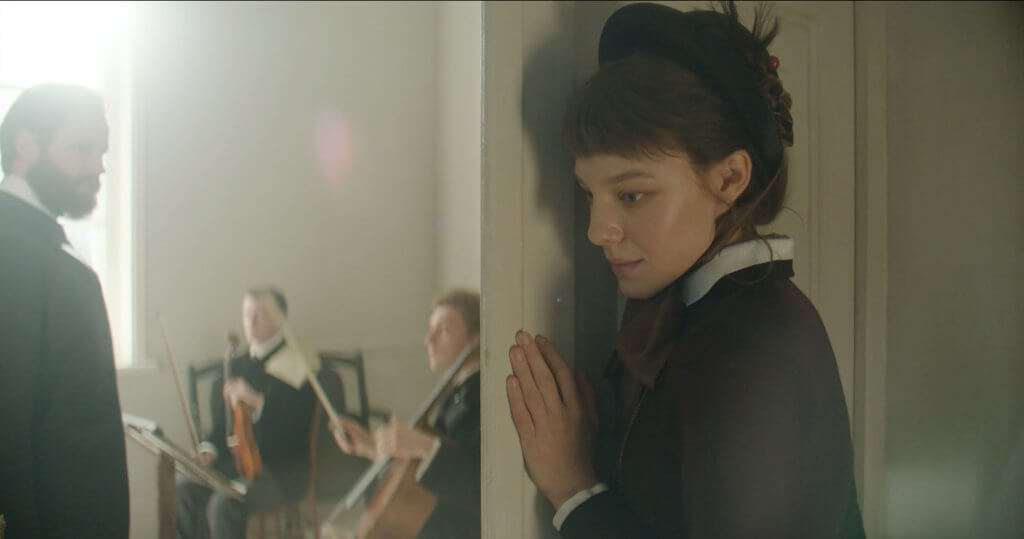Kirill Serebrennikov may be the most controversial figure at this year’s Cannes Film Festival, being a Russian filmmaker who was nonetheless accepted into the main Competition because of his dissident status. He certainly did not help things by defending his financier, the disgraced Russian oligarch Roman Abramovich, at the press conference for his new film Tchaikovsky’s Wife. There will always be murmurings that he was only accepted into the Competition for two consecutive years as a gesture of solidarity, not artistic merit.
Those rumors can be put to bed, as Tchaikovsky’s Wife is not necessarily a bad film that is only here because of sympathy points. But it certainly does not seem like a film by an exiled dissident artist. Tchaikovsky’s Wife is clearly a well-funded period drama with lavish costumes and an ample supply of extras. He has the budget to track his characters in elaborate crane and Steadicam shots. His craft is indeed mature and refined, always tracking character, and he shows that a filmmaker can do so much even with desaturated sets and only light and shadow. Still, there is nothing here that suggests a rebellious spirit or a dangerous courage by state-banned filmmakers like Jafar Panâhi and Mohammad Rasoulof.
Some of his visual choices like switching from warm to cool colors in an unbroken shot are obvious but effective; some visual choices like his protagonist talking to herself are merely obvious and obvious. Style and directorial control are the only things holding Tchaikovsky’s Wife together, because the script leaves much to be desired. The film can be summarized as follows: she loves him, and he doesn’t. The same note is then repeated again and again in only minor variations for two and a half hours. There are only so many ways to restate the same basic conflict before running it into the ground.

If the plot is thin, you can compensate with characters, but even the characters of Tchaikovsky’s Wife are lacking. The film is obviously about the titular Antonina Miliukova, with the famed Russian composer only playing a supporting role, even though the repressed homosexuality and artistic process of the man behind the “1812 Overture” might be worthier of exploration. Still, that’s fine, because this is the story Serebrennikov has chosen to tell, and I cannot impose my desire on top of his. However, I can criticize him for what he has chosen to present: Antonina is not written with enough complexity or depth to sustain the 2.5-hour runtime. The film, especially with the onscreen text explaining women’s difficulties in divorcing their husbands in 19th-century Russia, gives off very strong men-writing-feminism vibes. Towards the end, Serebrennikov turns to the mad woman trope that only reduces the protagonist into a device, not a person. The character does make a belatedly unexpected choice in the second hour, but that is quickly snuffed out and she is brought back to her singular trajectory. Further exacerbating the runtime is the droning, minimalist piano score that does not come close to matching Tchaikovsky’s own compositions.
One can strengthen the argument that Antonina is worthier of exploration than Tchaikovsky if Tchaikovsky is the boring straight white male. But he is actually gay! And the film totally misses the mark on the exploration of his homosexuality. For an hour and more, the only person who doesn’t seem to know that he is gay is not Antonina, but Serebrennikov himself; he only hints at but refuses to acknowledge it, almost out of embarrassment or shame. The most ironic part is that Tchaikovsky’s Wife actually has ample full-frontal male nudity, but it is presented in the straightest way possible. I once again cannot fault Serebrennikov for not making the film I wanted him to make, but I can definitely be outraged by his treating of the audience like children.
If there’s something that makes Tchaikovsky’s Wife even more miscalculated, it’s that the film’s actually about the perils of stan culture. Antonina is obsessed with Tchaikovsky from minute one, and her blind devotion at all costs certainly reminds me of the fervor in today’s pop culture following. It’s commonly known that people like Tchaikovsky were the BTS and Taylor Swift of their days. I personally don’t mind this strange relevance and find it slightly humorous, but I can see people finding it tonally inappropriate. Still, Tchaikovsky’s Wife takes itself so self-seriously that it’s hard to chuckle, even when the story may call for it.
Tchaikovsky’s Wife is the first film to screen in Competition, and Thierry Frémaux might have wanted to just get the controversy out of the way. I must admit that I was only drawn to the film because of Serebrennikov’s situation, my affinity for classical music, and the potential queerness in the story. After watching the film, I personally don’t believe this movie is worth all the hype and thunder. If anything, this is a lesson to throw one’s expectations out of the window before watching a film.
